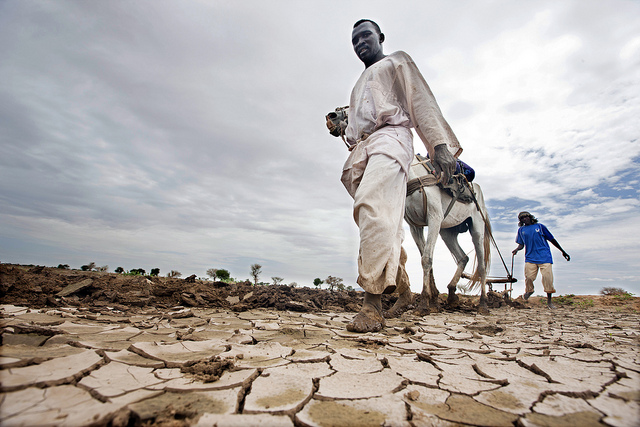
Australia is fast recognising the opportunities that the African continent represents, with about 200 Australian companies currently operating throughout the continent. Australian business and investment is worth more than $50 billion and diplomatic ties are now established with all African states and organisations. Australia–Africa relations are at a level that has never previously been reached and political co-operation between Australia and African states and organisations is now a tangible reality.
It’s important that Australia’s engagement with African countries be about establishing relations of mutual benefit. There’s a need to move beyond relations based predominately on the relationship of aid-donor and aid-recipient. Historically Australia hasn’t had significant relations with African countries or organisations, but the history of interaction between African states and other western states is one of oppression, extreme violence and the looting of natural resources. The tragic collusion between African political elites and western and non-western partners and beneficiaries has led to the enrichment of a few to the detriment of the many. The ‘many’ are left to live in severely impoverished situations within resource rich states. Although this pattern of exploitation has continued unabated throughout much of the African continent, Australia is entering relations with African states and organisations at a time when democracy and political stability and security in Africa is steadily increasing.
Australia–Africa engagement is, and must continue to be, about ‘lifting not looting’ the African continent. There’re many indications that the Australian government, universities and the business sector understand this, and are committed to ‘lifting’ Africa and establishing long-term sustainable relations based on the concept of mutual benefit. The economic growth rates in many African countries put them in the category of the fastest growing states in the world (15 of the top 30 in 2012).
The challenge for African governments is to ensure that these impressive economic success stories mean that African populations benefit and are ‘lifted’ out of poverty. External partners can help. Australian expertise in the extractive industries and in the agricultural sector can be used to assist in democracy consolidation, improving the rule of law and raising the quality of life in African states. Building relations which foster security and stability in African states will in turn lead to sustainable business, investment and political co-operation opportunities for Australia.
The International Mining for Development Centre (IM4DC) is a relatively new initiative, founded in 2011, in partnership with the University of Western Australia and University of Queensland, with funding from AusAid. The progress of this important initiative will be interesting to monitor. In their first report (PDF), released this year, Director Ian Satchwell, explained that;
… the Centre’s progress in helping resources rich developing countries leverage their minerals and energy endowments to grow their economies, reduce poverty and provide long-term economic and social benefits to their people. IM4DC works closely with Australian universities and research institutions to build capacity in mining governance and sustainable development through transfer of world-leading knowledge to developing countries in Africa, Latin America and Asia. We do this through delivering courses, workshops, study tours and collaborative linkages with universities and research institutions in developing countries, hosting mining for development leaders through fellowships, and shaping knowledge and leadership networks.
The report states that collaborations have been established with Institutions in Ghana, Mozambique, Mali and Zambia. Various projects have been supported, such as land rehabilitation research in Sierra Leone and the hosting of professional development fellowships for individuals from Ghana and Mali.
Australia identifies its future strongly within its Asian neighborhood. But it must be recognised that the natural resources required for a growing, more prosperous Asia, create corresponding opportunities for growth in African states. The Chinese demand for natural resources will be fulfilled by a global market that includes both Australia and African countries. Australia needs to position itself in the market place now. Africa represents a myriad of opportunities for Australia. Firstly, Australia’s deep expertise in mining extraction, both open cut and underground capability, will be sought after in Africa—through both our own companies and as service providers to others, such as Chinese companies. Secondly, through the breadth of our resource servicing skills, such as engineering, mine management, equipment supply, technical services around assay capability, exploration drilling and other related services such as, legal, accounting and finance.
In a recent article, Spio-Garbrah of DaMina Advisors, encourages Australian farmers, ‘to look to Africa as a major food export opportunity’. Australian engagement in the agricultural sector can be two pronged, both reaping benefits and assisting with ‘lifting’ African populations out of the worst cases of chronic food insecurity. In the agricultural sector, Australia is using its expertise in ‘dry land and semi-arid farming systems’ to improve agricultural productivity in many sub-Saharan African states. Australia‘s expertise in biosciences is being utilised to combat food insecurity. Chronic hunger and malnutrition are serious problems in many African states and detrimentally affect children’s physical and mental development. The Australian Centre for International Agricultural Research is assisting farmers in drought-affected areas (PDF) to develop appropriate farming techniques.
Australia–Africa engagement has to be based on mutual benefit and in the interests of African populations generally, as opposed to African political elites. This will ensure sustainable long-term relations and benefits. One only needs to look at the political history of various African states to realise that engagements that don’t engender greater economic equality and democracy tend to be short term and end in coups, rebel movements and wars. Australia is on the right path.
Sabrina Joy Smith is a PhD candidate with the Centre for the Study of the Great Lakes region of Africa at the Institute for Development Studies and Management, Belgium. She is currently based in New South Wales. Image courtesy of Flickr user United Nations Photo.

